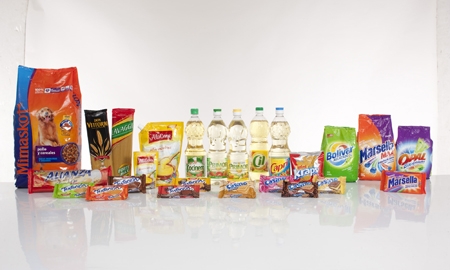Alicorp SAA is Peru’s most important company in the mass consumption sector, and it has set itself a key target for 2021. Although the current global economic situation presents clear challenges for any business, Alicorp hopes by 2021 to have become one of Latin America’s biggest companies.
“In addition to Peru, we have operations in Argentina, Colombia, Ecuador and Chile, and we export to more than 23 countries,” says the company’s managing director, Paolo Sacchi.
“This year’s international sales must represent 30% of our total turnover, with the acquisition of Chilean company Salmofood which prepares fish food.”
Alicorp, which also prepares foodstuffs for the aquaculture sector and supplies bread shops and restaurants, forms part of the Romero Group, one of Peru’s biggest economic entities.
We entered Ecuador, followed by Colombia and then Argentina. We did well in some places and not in others. Paolo Sacchi,
CEO of Alicorp |
Alicorp was formed in 1956 with the name of Anderson Clayton & Company. In 1971, the Romero Group acquired Anderson Clayton. Following a series of new acquisitions and mergers, the company was re-launched in February 1997 under the name Alicorp.
The company is today specialized in three business areas: Mass Consumption (mainly foodstuffs, personal care and home matters), Industrial Products (mainly supplies for bread shops and restaurants), and Animal Nutrition (balanced nutrition for fish and shrimps).
The company currently has 67 trademarks within the Mass Consumption and Industrial Products businesses. Each and every one of these trademarks boasts Alicorp’s quality seal.
This product expansion was a continuous growth process thanks, precisely, to the company’s geographical expansion. Alicorp began its internationalization process through investments in Ecuador, followed by Colombia, Argentina and Chile. Duplicating its business model in countries such as those mentioned has contributed without doubt to the company’s global development.
“We began our internationalization when our growth began to be important and it gave us a clear advantage in the sector. In some places it was good for us, and in other not so much. We learnt from some strategies, and copied models that worked well in some places,” Sacchi says.
That internationalization process has been strengthened so far this year with the purchase of Salmofood in Chile, at a price of US$62 million.
“Our competitive advantages are in our capacity to administer trademarks, with a genuine interest in offering consumers a high value-added product, to make their lives easier and less complex. We make use of scale economies, we have achieved cost efficiency in production processes, and we are constantly developing new innovative products,” Sacchi adds.
The managing director cites many more reasons to explain Alicorp’s success: “A wide knowledge of consumers’ insights, viewing each country as a distinct and exclusive market, the technology we use, and the administration of the talent of our people.”
A distinctive and noteworthy element of the success reached by the company is its highly qualified staff. For Sacchi, it is a fundamental aspect towards achieving the targeted aims of excellence. “We need worker employees who are equally able to undertake work in multi-tasks at the same time.”
Sacchi makes a car-driving analogy: The company’s employees have to be capable of driving 10 Ferraris at the same time, with the aim of reaching their finishing lines faster.
A programme called “Coffee Break” has shown to be very beneficial: it is the moment in which Sacchi speaks to Alicorp’s workers about key company aspects and the tasks that have been assigned to each one of them. He insists that through this he learns a lot about his employees and listens to their ideas for the future.
At every stage of the production processes, Alicorp has reached international competition standards and quality. In addition, it has increased its production levels each year since its creation.
An indication of the company’s growth is offered by the increase in its value since the beginning of the 1990s. The company was worth less than US$100 million in 1991, yet its value was fixed at US$2,000 million in 2011. All of this, according to Sacchi, is due in good measure to the economic growth experienced by the country. As far as Alicorp’s sales volume is concerned, it is sufficient to say that in the financial year of 2011, sales reached the not negligible sum of US$1,600 million.
Peru is one of the most dynamic economies in the world, and this has increased the citizens’ buying power, which is reflected in a change in consumer habits.
In addition to the expansion of its business to satisfy the new needs of the consumers, Alicorp considers among its challenges the reduction of poverty and the reaching of sustainability in Peru.
Its objective is to contribute to a higher level of welfare and an authentic progress of present and future generations. Alicorp also develops “inclusive business” models through business education. It likewise promotes child development and the employability of young people.

0 COMMENTS